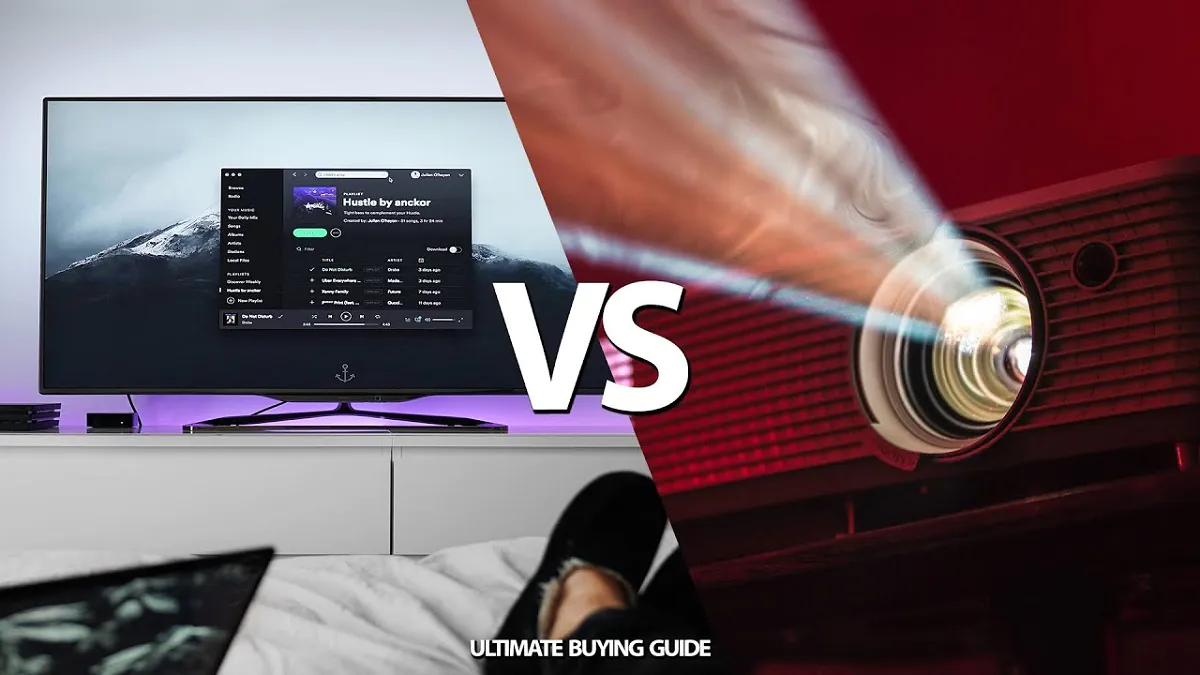
When it comes to designing a home theater system, choosing a TV or projector can be a serious dilemma.
In fact, both options have advantages and disadvantages, and there are cases where one is a better choice than the other. In order to decide which is best for us in our own home theater, we need to consider several factors.
TVs were once significantly behind their projectors in terms of size, but today, size is no longer necessarily the main difference. Although TVs are available in a variety of sizes, projectors are still the most cost-effective way to project a huge image.
Brightness is an important consideration for projectors, mainly because the contrast depends on the lighting conditions in the room. The more ambient light there is in a room, the more brightness you will need to ensure that the image stays sharp and clear. However, high brightness increases the price of the projector.
Most LED TVs can easily produce much higher brightness, but keep in mind that TV brightness is measured in nits, not lumens. Projectors have to work much harder to provide brightness like a cheaper LED TV, and the problem with projector bulbs is that over time their light dims – they eventually burn out – and they are quite expensive to replace.
Although laser projectors eliminate the problem of bulb replacement, they still do not have the same brightness as TVs.
However, if you completely darken the room, the projector will project an image with the right brightness and quality. If you want a vivid and clear picture in all kinds of light, with little or no maintenance, you want to live with a TV.
Contrast is determined by a combination of black level and brightness. While the brightness of the projector can be easily determined by looking at the lumen value, the black level is mostly determined by how dark the room is. In a brighter room, most projectors have no chance.
Premium 4K TVs with their wide color gamut and wide dynamic range are not in the cheap category, but the price of high-performance 4K HDR projectors is even higher. It’s better to buy a good 4K HDR TV and complete it with a quality sound system – or an Ultra HD Blu-ray player – than to get a high-end and very expensive 4K HDR projector. If you care about the highest possible resolution, you should definitely choose TVs, as only TVs are capable of 8K resolution.
Depending on the type of projector (DLP, 3-chip LCD or LCOS), the projectors will provide excellent color at an affordable price. TVs require more serious technology to get the best color, thereby increasing merchandise. The best 4K TVs can produce a wider range of colors than most projectors, but the projectors are also becoming more modern and advanced.
If we look only at the price-performance ratio, then the TVs are the winners. If costs don’t matter, you can get a much bigger image with a projector with outstanding image quality.
TVs are easier to install. Large TVs may be heavy and a bit fragile, but they are easy to place and integrate into your home theater system and easy to use.
Placing projectors requires more planning. We need to make sure we have the space we need – as the screens on the projectors are large. It is also important that the projector is positioned correctly.
The latest laser projectors can be placed closer to the wall and are equipped with their own built-in speakers, which makes installation even more difficult.
Excellent projectors include the Samsung Premiere LSP 9T or the JVC DLA NX7 .And if you’re looking for a cost-effective solution, the BenQ MH530 is worth getting.
TVs have speakers, often with very serious performance. Some projectors also include speakers, but with the exception of the new laser-based models mentioned above, they are usually small and often located behind or above the viewers ’heads.
The primary role of TVs is video. If you want a maximum cinematic experience, whether you use a TV or a projector, you need a quality sound system. But even the best quality speaker alone is not enough for the perfect sound experience. It is also worthwhile to improve the acoustics of the room, with acoustic sound-absorbing and diffuser panels developed for this purpose. Products from Perfect Acoustic effectively improve the sound of interiors.
TVs are easier to use, easier to set up, have no problem with ambient light and do not require light bulb replacement. Plus, it’s available for many smart TVs with built-in streaming capabilities, voice control, and many applications.
Leave a Reply